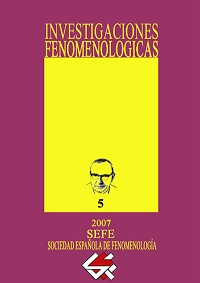Derrida contra Husserl : la crítica de la voz y el fenómeno a la teoría del signo de la primera investigación lógica de Husserl
DOI:
https://doi.org/10.5944/rif.5.2007.5462Palabras clave:
Filosofía,Resumen
In this article the author tries to deconstruct the critic against Husserl´s analysis of the signs in the first logical investigation as it is exposed in Derridas ´s work Speech and Phenomena (1967). Derrida’s main critic is that the husserlian distinction between two kinds of signs – expressions (signs with signification) and indications- is unjustified and artificial. He also rejects the husserlian topic that sustains the ideality of significations and misinterprets the concept of meaning by understanding it as “the intention to say something”. The author of the article tries to show how Derrida manipulates the very strict husserlian notions by means of small but severe conceptual perversions that allow him to criticize without reason Husserls understanding of the meaning as built upon some conscious “forgetting” of the empiric side and of the indicative function of the expressions. The article begins with an exposition of some important points of the first logical investigation and then tries to show how Derrida manipulates them in his “approach” to the husserlian text.Descargas
Los datos de descargas todavía no están disponibles.
Descargas
Publicado
2007-01-01
Cómo citar
Conde, F. (2007). Derrida contra Husserl : la crítica de la voz y el fenómeno a la teoría del signo de la primera investigación lógica de Husserl. Investigaciones Fenomenológicas, (5), 153–207. https://doi.org/10.5944/rif.5.2007.5462
Número
Sección
Notas para el debate
Licencia
![]()
Reconocimiento (by): Se permite cualquier explotación de la obra, incluyendo una finalidad comercial, así como la creación de obras derivadas, la distribución de las cuales también está permitida sin ninguna restricción.







